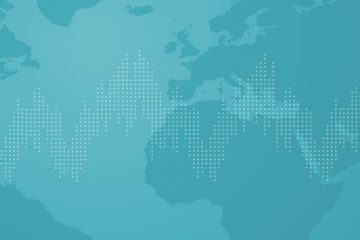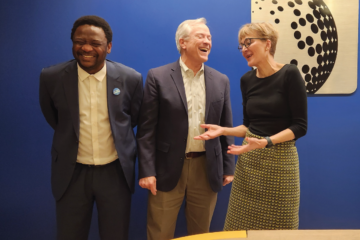
WASHINGTON, D.C. —Celebrating Mother’s Day won’t be easy for many families this year. Children who don’t live with their mothers may not be able to see Mom thanks to coronavirus social distancing. And that’s just one example of how the pandemic is amplifying longer-term trends to make American family life more complicated than ever before, according to researchers at Population Reference Bureau (PRB).
Millions of children are at increased risk of falling into poverty due to pandemic-related job losses, while distancing protocols are separating some children from parents living in a different household. Already, more than one in three U.S. children under age 18 (36%) does not live with both biological parents. The economic and social constraints caused by the ongoing pandemic have exacerbated the challenges of these family dynamics as some noncustodial parents find it complicated, risky, or even impossible to spend time with their children.
PRB researchers say poor families will bear the brunt of the health effects and economic hardships created by the ongoing crisis.
“This situation is especially precarious for low-income Americans, who are more likely to have complex family ties spanning multiple households,” said Mark Mather, PRB associate vice president of U.S. Programs. “Not only are they more vulnerable to becoming infected with coronavirus at work or while commuting, they are less likely to have health insurance or an economic cushion to help them when they lose their jobs.”
Children are less likely to live with both parents in part because Americans are increasingly having children in cohabiting relationships, which tend to be less stable than marriages, according to research supported by the Eunice Kennedy Shriver National Institute of Child Health and Human Development (NICHD). Not only are more children being born to unmarried parents, but more parents have children with multiple partners. These family changes lead to complex living arrangements that can make it harder for parents to invest time and money in their children living in another household, increasing the odds of a child falling into poverty.
The findings are part of broader research on the ways family life has become more complex, unstable, and unequal over the past decade from NICHD-funded Population Dynamics Research Centers, including those at the University of Texas at Austin; University of Michigan-Ann Arbor; University of Wisconsin-Madison; Bowling Green State University; Ohio State University; Princeton University; and University of California, Los Angeles. Among the findings:
- In 2019, about 4% of children lived in a cohabiting family with both of their biological parents, 9% in a step-parent family (either married or cohabiting), 22% in a single-parent family (mainly headed by their mothers), and 4% in other arrangements, such as with grandparents. About 60% lived with both biological parents in a married family household.
- An estimated 14% to 25% of all parents have children with more than one partner.
- The share of Americans who are married has fallen to record low levels. In 2019, about 53% of all U.S. adults ages 18 and older were currently married, compared with 70% in 1970.
- Living together instead of marrying has become the norm. The share of women ages 25 to 29 who have ever cohabited rose to 73% in 2011-2013 from 49% in 1995.
- The share of children born to unmarried parents has doubled since the 1980s, rising from 21% in 1980-1984 to 43% in 2009-2013.
- U.S. divorce rates remain among the highest in the world, with rates increasing dramatically among people ages 50 and older, possibly a sign of the instability of second marriages.
The family researchers also noted that these increasingly complex family structures could negatively affect children’s health and well-being, especially in families with fewer economic resources and social support.
About Population Reference Bureau (PRB)
Contact: Liselle Yorke, 202-939-5463
PRB informs people around the world about population, health and the environment, and empowers them to use that information to advance the well-being of current and future generations. Find out more at www.prb.org. Follow us on Twitter @PRBdata.

 ">
">




